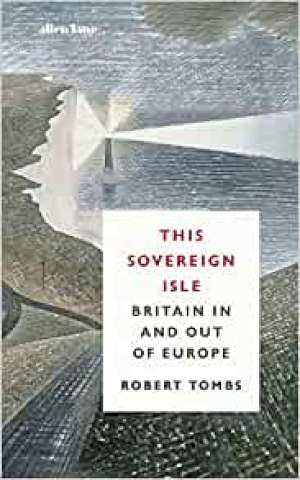08 March 2021
This Sovereign Isle
Britain In and Out of Europe
Robert Tombs
2021, Allen Lane, 203 pages,
ISBN 9780241480380
Reviewer: Kevin Gardiner, Rothschild & Co/Cardiff Capital Region Economic Growth Partners

Yes, I know: another book on Brexit. I was keen to review this one though because it sounded different, and I was not disappointed. It is also short, and very readable.
Robert Tombs is a Cambridge historian who decided, without great conviction at the time, to vote to leave the EU – partly because of a chance meeting with Kenneth Arrow shortly before the vote: Arrow was not in favour of leaving, but suggested it would not be a disaster.
Tombs’ account of the context is valuable to us economists for at least two reasons. First, he reminds us that the debate was not only – or even primarily – about economics, despite his own initial nervousness on that score. Second, he does not subscribe to the UK’s miserabilist, declinist, establishment outlook.
Yes, he cites the Dean Acheson quote – the one that launched a thousand quips – but sees less profundity in it than most. The UK’s lost role was not viable anyway, and its post-war failings were not that stark. He is not starry-eyed about the future – but nor does he default to the “monotonous pessimism” (p95) of our broadsheet intellectuals.
It is a refreshing stance. I voted to remain: I think the UK will prosper outside the EU, but it would have done even better had it stayed in; and I accept the EU politics, warts and all (I’m Welsh, and have no time for Plaid either). But it is always good to have your ideas challenged, and Tombs’ account suggests that the architects of Project Fear, and the People’s Vote, behaved just as badly as the wilder leavers. “If intellectuals are meant to enrich and enlighten public debate, this was not their finest hour.” (p 95). What on earth were they thinking?
Tombs describes the lack of self-awareness that culminated in a situation in which “… A majority of MPs and their speaker… had taken or tried to take blatantly unconstitutional actions… Of course they could argue… that the electorate was uncertain, or poorly informed, or had changed its mind. These arguments would undermine every democracy based on the rule of law: any election result could be said to be based on misunderstanding…” (p 120, my emphasis). The de haut en bas attitude of many remainers perhaps explains why some people voted to leave to begin with.
Treasury economists may also unwittingly have fostered the leave cause. Tombs notes how the Blair government had earlier allowed “… the immediate free movement of people from the new Eastern European member states – something that France and Germany refused… This was proclaimed wholly beneficial… but it evidently benefited some more than others…” (pages 48-49). It wouldn’t be the first time that textbook models obscured political common sense.
I don’t agree with all Tombs’ arguments. For example, I don’t see the euro as “the most disastrous policy in the history of European integration” (p42). Exchange rates do not determine long-term economic success – rather the opposite. Greece and Italy struggle because of what and how they produce, not its price; you don’t buy German machinery because it’s cheap. To be fair to Tombs, economists often get this the wrong way round too. Similarly, he is in good company when he caricatures Ireland’s post-1990 transformation (p 112: declaration of interest – I wrote the “Celtic Tiger” note in 1994).
Overall, Tombs’ book certainly helps me question my own remainer bias. And, as noted, I agree that leaving the EU does not have to be game-changing for the UK economy: the costs are lost opportunities, and will likely be submerged, eventually, beneath the rising tide of prosperity.
Although I’d have liked us to stay in, Tombs is right to talk of the EU being “brilliant” at creating “what Milan Kundera called political kitsch” (p156). The best books send you off in search of others, and any readers who discover the closing section of “The Unbearable Lightness of Being” as a result of reading this one will have certainly got their money’s worth.
